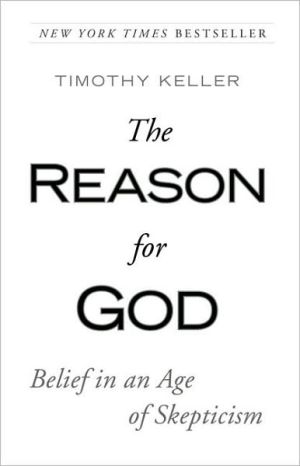The Reason for God: Belief in an Age of Skepticism
A New York Times bestseller people can believe in—by “a pioneer of the new urban Christians” (Christian Today magazine).\ Timothy Keller, the founding pastor of Redeemer Presbyterian Church in New York City, addresses the frequent doubts that skeptics and non-believers bring to religion. Using literature, philosophy, anthropology, pop culture, and intellectual reasoning, Keller explains how the belief in a Christian God is, in fact, a sound and rational one. To true believers he offers a...
Search in google:
The remarkable New York Times bestseller by the "C.S. Lewis for the 21st century" (Newsweek).A New York Times bestseller people can believe in-by a "pioneer of the new urban Christians" (Christian Today magazine).Timothy Keller, the founding pastor of Redeemer Presbyterian Church in New York City, addresses the frequent doubts that skeptics and non-believers bring to religion. Using literature, philosophy, anthropology, pop culture, and intellectual reasoning, Keller explains how the belief in a Christian God is, in fact, a sound and rational one. To true believers he offers a solid platform on which to stand against the backlash toward religion spawned by the Age of Skepticism. And to skeptics, atheists, and agnostics he provides a challenging argument for pursuing the reason for God. Publishers Weekly In this apologia for Christian faith, Keller mines material from literary classics, philosophy, anthropology and a multitude of other disciplines to make an intellectually compelling case for God. Written for skeptics and the believers who love them, the book draws on the author's encounters as founding pastor of New York's booming Redeemer Presbyterian Church. One of Keller's most provocative arguments is that "all doubts, however skeptical and cynical they may seem, are really a set of alternate beliefs." Drawing on sources as diverse as 19th-century author Robert Louis Stevenson and contemporary New Testament theologian N.T. Wright, Keller attempts to deconstruct everyone he finds in his way, from the evolutionary psychologist Richard Dawkins to popular author Dan Brown. The first, shorter part of the book looks at popular arguments against God's existence, while the second builds on general arguments for God to culminate in a sharp focus on the redemptive work of God in Christ. Keller's condensed summaries of arguments for and against theism make the scope of the book overwhelming at times. Nonetheless, it should serve both as testimony to the author's encyclopedic learning and as a compelling overview of the current debate on faith for those who doubt and for those who want to re-evaluate what they believe, and why. (Feb. 14)Copyright 2007 Reed Business Information
Introduction ixPart 1 The Leap of Doubt1 There Can't Be Just One True Religion 32 How Could a Good God Allow Suffering? 223 Christianity Is a Straitjacket 354 The Church Is Responsible for So Much Injustice 525 How Can a Loving God Send People to Hell? 706 Science Has Disproved Christianity 877 You Can't Take the Bible Literally 100Part 2 The Reasons for Faith8 The Clues of God 1319 The Knowledge of God 14810 The Problem of Sin 16511 Religion and the Gospel 18012 The (True) Story of the Cross 19313 The Reality of the Resurrection 20914 The Dance of God 222Epilogue: Where Do We Go from Here? 237Acknowledgments 253Notes 255Index 299
\ From Barnes & NobleThis book owes at least a small debt to the author's congregation. In New York City's Redeemer Presbyterian Church, Timothy Keller ministers to a flock of 15,000. Over the years, Rev. Keller has compiled a list of doubts by parishioners and visitors. In The Reason for God, he responds to seven common objections to religion in general and/or Christianity in particular. For believers or would-be believers, this book provides a reassuring response to books such as God Is Not Great, Letter to a Christian Nation, and The God Delusion.\ \ \ \ \ Publishers WeeklyIn this apologia for Christian faith, Keller mines material from literary classics, philosophy, anthropology and a multitude of other disciplines to make an intellectually compelling case for God. Written for skeptics and the believers who love them, the book draws on the author's encounters as founding pastor of New York's booming Redeemer Presbyterian Church. One of Keller's most provocative arguments is that "all doubts, however skeptical and cynical they may seem, are really a set of alternate beliefs." Drawing on sources as diverse as 19th-century author Robert Louis Stevenson and contemporary New Testament theologian N.T. Wright, Keller attempts to deconstruct everyone he finds in his way, from the evolutionary psychologist Richard Dawkins to popular author Dan Brown. The first, shorter part of the book looks at popular arguments against God's existence, while the second builds on general arguments for God to culminate in a sharp focus on the redemptive work of God in Christ. Keller's condensed summaries of arguments for and against theism make the scope of the book overwhelming at times. Nonetheless, it should serve both as testimony to the author's encyclopedic learning and as a compelling overview of the current debate on faith for those who doubt and for those who want to re-evaluate what they believe, and why. (Feb. 14)\ Copyright 2007 Reed Business Information\ \ \ Library JournalAs founder of Redeemer Presbyterian Church in New York City, Keller has heard many people question religious beliefs and ask questions like, "How can there be one true religion?" or "How can a loving God allow suffering?" In his new book, written to help counter books like Richard Dawkins's The God Delusion , Keller addresses these and other questions and gives his reasons for believing in God unconditionally. He shares his personal path to Christianity through experiences with his own doubts about faith and conversations he holds with those still struggling with personal belief. Using literature, philosophy, and pop culture, the author gives convincing reasons for a strong belief in God. It is refreshing to read a book that presents a religious view without being overly critical of the secular side presented in other books. An excellent conversation starter, this book presents a valid, well-written, and well-researched argument and should be considered for public libraries.-Jennifer Kuncken, Williamsburg Regional Lib., VA\ Copyright 2006 Reed Business Information.\ \








